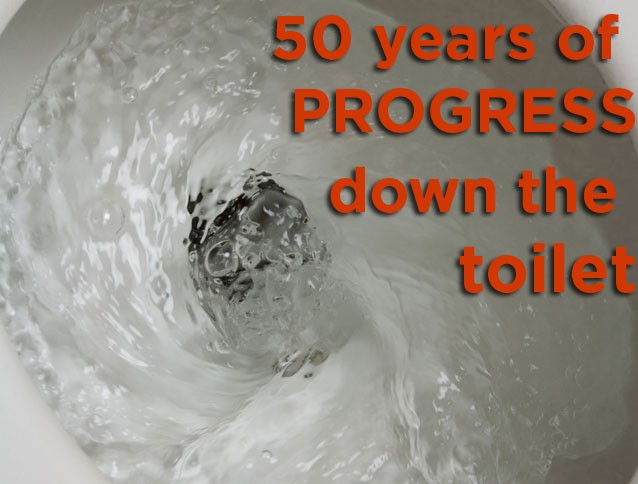50 years of progress down the toilet
The far right's shocking last-ditch attack in North Carolina
By John Grooms
In 1961, Democratic Governor Terry Sanford sought to repair North Carolina's educational system, which at the time ranked in the bottom five in reading, math and science among all states. He proposed nearly doubling spending on early education and consolidating various universities into an organized UNC system. To do that, he asked the General Assembly to levy new sales taxes.
Conservatives within the legislature (all Democrats, as this was a one-party state at the time) put up fierce resistance to the new taxes, decried Sanford as a tax-and-spender, and downplayed the importance of schooling — after all, the state's politically influential cotton mills didn't need educated workers. Sanford, though, had a broader, more future-oriented vision of the state, and proved adept at gaining supporters among lawmakers. Long story short, public support for Sanford's "new vision" overcame citizens' reluctance to pay more taxes. That support reverberated in the General Assembly, where enough politicians interested in being re-elected sided with Sanford to change the state's history. Later, Sanford started the state's community college system which, together with better K-12 schools and a beefed-up university system, created the educated population that out-of-state businesses needed in order to expand here. And thus was born our state's reputation for forward-looking leadership.
That reputation is at serious risk these days, as a legislature bloated with backward-thinking lawmakers and a willing governor have been busy pulling the rug out from under Sanford and (most of) his successors' legacy.
In 2010, after more than 50 years of relatively moderate governance had brought big boosts to education and the public safety net — and in turn improved the state's national reputation — North Carolina fell into the hands of the well-financed far right. The GOP takeover was largely bankrolled by Art Pope, the retail-store magnate whose influence on the state Republican Party has been well-publicized. In 2012, after redrawing election districts to make their takeover easier, the GOP won a supermajority in the General Assembly and brought along former Charlotte Mayor Pat McCrory as rubber-stamper and mascot, er, governor. Their takeover turned out to be one filled with deliberate and dreadful consequences.
According to Raleigh's Public Policy Polling, 40 percent of state Republicans disapprove of the legislature's lawmaking and only 36 percent approve. Only 20 percent of North Carolina voters approve of the current legislature's lawmaking, while 56 percent disapprove.
"It's frankly baffling to me at times," said Rodney Ellis, president of the North Carolina Association of Educators. "It's as if [GOP lawmakers] are turning back the hands of time and going back to a time in which most citizens of the state would not want to be."
The good news is that if public reaction to the General Assembly's current session is any indication, the Tea Partiers who took over the state GOP could be in trouble come Election Day next year. But it's not just the public's reaction that should worry Republicans. When Democrats routinely quote Republican North Carolina governors of the past to boost their arguments against current GOP bills — and when polls show that many Republicans in North Carolina disapprove of the General Assembly's Tea Party agenda — you know state government has taken a hard right turn, right off the rails.
In a state that has long enjoyed a reputation for political moderation — former U.S. Sen. Jesse Helms notwithstanding — the GOP's far right knows its days in power are numbered, due to the looming demographic changes that favor Democrats. In that context, the current legislative session seems more and more like a last-ditch effort to tether North Carolina to the "good ol' days" before the 1960s brought progress and a modicum of enlightenment to the state. Let's take a look at the areas of progress in North Carolina's history — and how the current batch of lawmakers has tried to screw with them.
Education
50 Years of Progress: After Sanford, funding for colleges and public schools rose dramatically, along with teacher salaries at both levels. Modern schools were constructed. Eventually, the University of North Carolina became one of the premier public university systems in the country. By the late 1960s, the state had risen to 21st in the nation in public-school teacher salaries, the state's tax-funded K-12 schools earned a good national reputation and have now become a model for improvement of schools in other states. Historians, as well as polls of citizen, consistently say that education has been a critical part of the state's success.
Progress Down the Toilet: The General Assembly seems determined to wreck public education in North Carolina. Last session, cuts to the UNC system raised alarms from UNC-Asheville to UNC-Wilmington, while K-12 schools eliminated more than 4,300 teaching jobs. Lawmakers then set up a voucher program that would take $100 million from K-12 public education and give it to private schools, despite the fact that more than 60 percent of North Carolinians oppose the measure, according to Public Policy Polling. Lawmakers also voted to increase class sizes, especially in early grades. They've proposed doing away with teaching-load limits for teachers in grades 7-12 and cuts that could eliminate up to 3,000 teacher assistants in early grades. The House wants to drop students with disabilities and students with limited English proficiency from the pre-K program. Another measure would take away the $3,000 salary supplement given to new teachers with master's degrees — a blow to educators who are already among the most underpaid in the nation (46th out of 50). Additionally, funding for scholarships for college students who agree to teach in North Carolina schools for at least five years will be phased out. And rather than focus on existing public schools, the lawmakers want to expand the number of charter schools. To do so, it's been proposed that standards for charter school teachers be compromised to the point that a teaching degree would not be necessary.
"What the legislature has done to education is very disturbing," said Ellis, president of the North Carolina Association of Educators. "I understand there's a larger agenda out there, they want to privatize education, period. I get that. But I can't understand how the leaders in our state can justify turning back the pages of history and denying all of the advancement that we've made over the years."
Taxes/Economy
50 Years of Progress: The state has helped low-income citizens via the Earned Income Tax Credit, which lowers tax bills for the 900,000 low-income working North Carolinians who qualify. Former President Ronald Reagan called the credit the "best anti-poverty, the best pro-family, and the best job-creation measure" that government policy makers had come up with. Over the years, too, the state has generally made sure that big businesses pay their fair share of taxes.
Progress Down the Toilet: The General Assembly took on tax reform early in the session — McCrory even campaigned on it. Proposals vary slightly, and a more extreme version pushed by Sen. Bob Rucho, R-Matthews, was toned down considerably, a result of which was Rucho's resignation as co-chairman of the Senate Finance Committee. But whether the final tax "reform" is closer to the House or Senate version, corporate and personal income taxes will be cut, and at least some of that lost revenue will be made up by increasing sales taxes on items or services that are not currently taxed. Lawmakers in both houses also voted to end the Earned Income Tax Credit, Reagan's opinion be damned.
Chris Fitzsimon, director of NC Policy Watch, one of the state's leading progressive advocacy organizations, said regardless of what Republicans advertised, corporations were always the victors."The [legislature's Republicans] started off with high-minded ideas about modernizing our tax code, but what new tax policies have clearly been all along is simply a giant tax cut for corporations and wealthy people, paid for by moderate- and low-income families," Fitzsimon said. "It's a tax shift more than a real reform."
Lawmakers also drastically cut weekly unemployment benefits from a maximum of $535 to $350, and shortened the period in which workers can receive them from 26 weeks to 12-20 weeks, depending on the unemployment rate — an especially harsh measure given that unemployment in North Carolina is the nation's fifth highest, at 8.8 percent. North Carolina is the only state making such changes to its unemployment benefits, leading Esquire columnist Charles Pierce to use the headline "North Carolina takes a turn as Mississippi."
Just who are these crazy legislators in Raleigh?
Pictured below are just a few of the offenders, noted with their respective offenses.
(7.) Pat McCrory – Republican Governor
(3.) Rep. Nelson Dollar – a chief House budget writer
(11.) Sen. Jerry Tillman, (8.) Sen. Dan Soucek – primary sponsors of SB337, which would lessen certification requirements of charter-school teachers
(6.) Rep. Julia Howard – primary sponsor of HB82, which limited Earned Income Tax Credit
Sens. (10.) Bob Rucho, (4.) Bill Rabon – primary sponsors of a tax-reform plan that would have replaced income tax with broader sales tax
(10.) Rucho, (4.) Rabon, (2.) Sen. Andrew Brock – primary sponsors of a bill that greatly reduces maximum weekly benefits for unemployed
(10.) Rucho, (12.) Sen. Tom Apodaca, (5.) Sen. Harry Brown – primary sponsors of SB4, which barred state-run health benefit exchange and rejected Affordable Care Act's optional Medicaid expansion
(9.) Reps. Ruth Samuelson, (1.) Pat McElfrat – primary sponsors of HB 854, Women's Right to Know Act, which requires women wait 24 hours before abortion and undergo ultrasound, among other tenants
(4.) Rabon – Primary sponsor of SB151, Coastal Policy Reform Act, which repeals a ban on terminal groins
Health Care/Reproductive Rights
50 Years of Progress: Over the decades, the state gradually increased its commitment to expanding health care. Medicaid participation was bumped up bit by bit, the state established rural health clinics in the 1970s (thanks to a moderate GOP governor, the late Jim Holshouser, an early mentor of Pat McCrory), and for a few years after Roe v. Wade, medically necessary abortions were financially covered by the state for women who needed help.
Progress Down the Toilet: Last year, the General Assembly passed a law that requires a woman wanting an abortion to undergo a 24-hour waiting period, listen to a song and dance designed to change her mind, and undergo an ultrasound and heart-tone monitor of the fetus, although that last requirement is currently frozen under legal injunction.
Moreover, North Carolina is one of 17 states that refused to expand Medicaid under the Affordable Care Act, thus denying coverage to a half-million uninsured North Carolinians, even though the federal government would pay for the extra coverage for three years, and 90 percent of the cost afterward. A Rand Corp. analysis revealed that the increased federal funding — and states' savings from not having to pay for uncompensated medical care — would save all 50 states billions of dollars a year. To many observers, refusing Medicaid expansion is nonsensical.
"It's astonishing that they would deny health care to half a million people," Fitzsimon said, "and deny billions of dollars to our hospitals, all because they don't like President Obama. 'Wild-eyed liberals' like governors Chris Christie, Jan Brewer and Rick Scott managed to figure out that Medicaid expansion is in the best interests of the people in their states, whether they like the president or not."
McCrory also wants to privatize management of the state Medicaid program, which would send North Carolina tax dollars to out-of-state managed-care companies while raising health care costs and reducing access to care. Under another bill, teenagers would have to get notarized parental consent to seek care for substance abuse, mental health, STIs, birth control or pregnancies. In addition, the legislature is likely to approve a bill requiring applicants for Medicaid and other benefits to take, and pay for, drug tests — despite the 11th U.S. Circuit Court of Appeals' rejection of a similar law in Florida, upon which the North Carolina bill was based.
Voting Rights/Clean Elections
50 Years of Progress: Since 2000, voter access to the polls has been expanded through popular early-voting periods, which put North Carolina in the top 15 states for voter participation. In 2004, in a bipartisan effort to decrease the influence of big money on elections, North Carolina implemented a "clean-elections" program that offers public grants to judicial candidates. Later, the public-financing option was expanded to include races for state auditor, treasurer, superintendent of public instruction and insurance commissioner.
Progress Down the Toilet: The General Assembly has been on a voter-suppression tear, beginning with a new requirement that all voters present a photo ID at the polls, which endless studies show will suppress vote totals for the elderly, minorities and students — demographics that just happen to vote predominantly Democratic. The GOP is also set to shorten early voting times, eliminate Sunday voting, and put an end to same-day registration, although public opposition to cutting voting times could derail the measure. In addition, the North Carolina House passed a bill, and the Senate is expected to follow suit before session ends, doing away with all of the state's "clean-elections" efforts.
Environment/Energy
50 Years of Progress: North Carolina has long had relatively progressive policies regarding environmental protection, creation of nature preserves and greenways, and coastal protection. In the early 1970s, the Coastal Zone Management Act started setting guidelines for new buildings on the coast and outlawed environmentally harmful beach jetties, or groins. In 2007, North Carolina adopted the Renewable Energy and Energy Efficiency Portfolio Standard, also known as the Clean Energy Standard, which requires state public utilities to acquire up to 12.5 percent of their energy through renewable resources or energy-efficiency measures. The Clean Energy Standard is supported by Duke Energy and has lowered residential bills. Polls also show overwhelming support in the state for expanding the use of renewable energy. In 2007, the General Assembly created the Biofuels Center of N.C. to promote feed stocks for use as fuel.
Progress Down the Toilet: The General Assembly made national news in 2012 when it forbid the state from establishing any coastal development policies based on the latest scientific predictions of how much the sea level will rise. This session, lawmakers decided to repeal the ban on those butt-ugly beach groins, too. And although offshore oil drilling is not likely to pass during the current session, it is expected to be a GOP priority in the next one.
Republicans also want to do away with the Clean Energy Standard, although public support for the standard has slowed the repeal's momentum. If it isn't passed this session, it's sure to come up again the next time around. The state is also poised to allow fracking, although ardor for the controversial extraction method has cooled considerably. Nonetheless, lawmakers like the proposal enough to revive it.
The N.C. Senate eliminated $1.2 million set aside for the highly popular greenways, which increase home sales and property values around them. Had the $1.2 million remained, it would have brought in another $4.5 million in matching funds to build even more greenways. Fortunately, public reaction to the Senate's move was negative enough for the House to consider backing off slightly in its version of the bill. The legislature is also set to gut the Biofuels Center budget or eliminate it altogether.
THE IMMEDIATE IMPACT of the changes making their way through the General Assembly will be brutal. More than 70,000 unemployed North Carolinians lost their unemployment benefits on July 1, teachers will have to teach larger classes, particularly in the early grades, with fewer teacher assistants. Some small businesses will be negatively affected by having to charge sales tax, but larger businesses will get a big tax break. Our public university system will continue, minus a slew of professors, while students will have to pay still more for their college education. Beaches will be uglified, women needing an abortion will continue to be treated as potential criminals, and around 500,000 poor North Carolinians will be without health care. The long-term impact of the changes, unless they are repealed by a future legislature, will be the creation of a state of dumbasses who work for next to nothing and without decent health care, and who, if they're lucky, will be able to recuperate at one of our coast's shrinking beaches. It's a hell of a comedown for a state that has prided itself on being different from the goober states surrounding us. One has to wonder how many people will leave for greener pastures. One has to wonder, too, whether high-paying businesses will be attracted to a state with so little regard for education and the health of its own citizens.
Speaking of...
Latest in Cover
More by John Grooms
Calendar
-

Wine & Paint @ Blackfinn Ameripub- Ballantyne
-

Queen Charlotte Fair @ Route 29 Pavilion
-

NEW WINDOW GALLERY-Pat Rhea-ACRYLIC PAINTINGS-April 05-30 2024 VALDESE, NC 28690 @ New Window Gallery/Play It Again Records
- Through April 30, 12 p.m.
-

TheDiscountCodes
-

Face to Face Foundation Gala @ The Revelry North End
-
Esports in Charlotte Takes Off: A Guide to Virtual Competitions and Betting
-
Homer's night on the town 41
If you drank a shot with the Knights mascot on Sept. 20, you were basically harboring a fugitive
-
Beauty Industry Trends To Look Out For In Charlotte In 2022

































